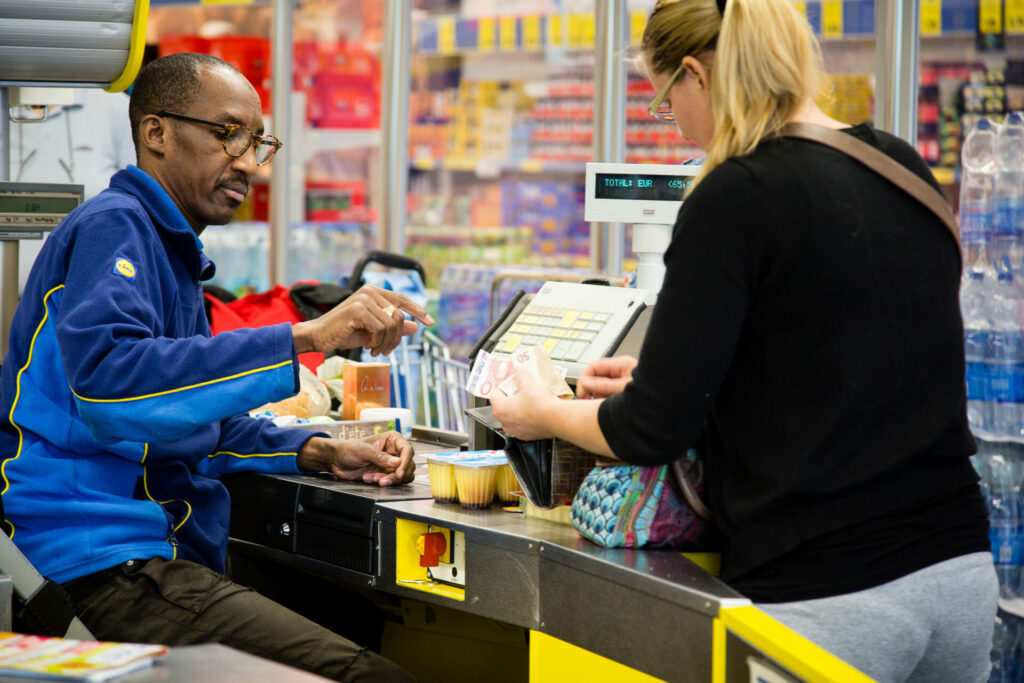Worth over €31 billion, the Belgian food retail market is a playground for the large retail groups, who capture around 85% of the market, according to Belgian newspaper La Libre Belgique.
While these companies may hold a dominant position, they are not very transparent, blocking any attempt to publish information about the market share of different supermarket brands. La Libre Belgique, citing industry magazine Gondola, offers a cross section into the Belgian food retail market.
The five largest groups, in terms of 2021 sales, are the Colruyt Group (Colruyt, Okay, Bio Plant, Cru, Spar), Ahold Delhaize (Delhaize, AD, Proxy, Shop’n Go, Albert Heijn), Carrefour Belgium (Hyper, Market, Express, Rob), Aldi, and Lidl. Combined, they occupy the vast majority of the retail market, with tougher competition for the remaining 15%.
According to the Gondola Academy, the turnover of the top eleven main food distributors in Belgium amounted to €29.3 billion. Adding stores such as Action, Krudivat, Traffic, and Hema, who stock some basic food goods, this total jumps to 31 billion.
Silvie Vanhour, Managing Partner at the Gondola Academy, says that the industry hardly grew last year. “This is only 0.6% more than in 2020, but, with the closure of horeca for seven months, this was a truncated year, unrelated to its true potential.”
According to data shared by La Libre Belgique, the big three in Belgium (Colruyt, Delhaize, Carrefour) occupy some 66.9% of the retail food market. 18.2% is controlled by the “hard discounters” Aldi and Lidl. A further 9.5% belong to other smaller supermarket chains and 5.4% to “near food” retailers.
Last year, Gondola Academy says that Dutch supermarket chain Jumbo grew by 112%. Similarly, significant growth was recorded at Albert Heijn (+25.8%) and Kruidvat (+16.7%).
“For the first two, growth is due to the opening of new points of sale. For the third, it is mainly because 2020 was a very difficult year. In reality, the brand turned to its results for 2019,” the group explained.
Related News
- Organic farming sector growth slows down in 2021
- Supermarkets in Belgium up to 12% more expensive this quarter
Gondola also notes that the growth of hard discounters in Belgium has been significant. In 2015, the market share of Aldi and Lidl was just 17.4%. Now, it has grown to 18.2%. As inflation rises, it is expected that their market share will grow further. Gondola says that Lidl is growing much faster than Aldi thanks to ambitious development plans.
Over the last two years, French supermarket chain Intermarché has made significant inroads in the Belgian market, growing by 34.1%. It has done this without the need to open many stores, ‘
New entrants into the market, growth of “near food” outlets such as Action and Hema, and independent stores, help break-up the hegemony of the big three and keep the Belgian market competitive.
There are 3,814 supermarkets and food retail stores in Belgium, up 8% from 2015. One store, Gondola says, serves some 3,000 people. “It’s a lot,” the group notes, but insists that it ensure a “healthy competition” on the market.

